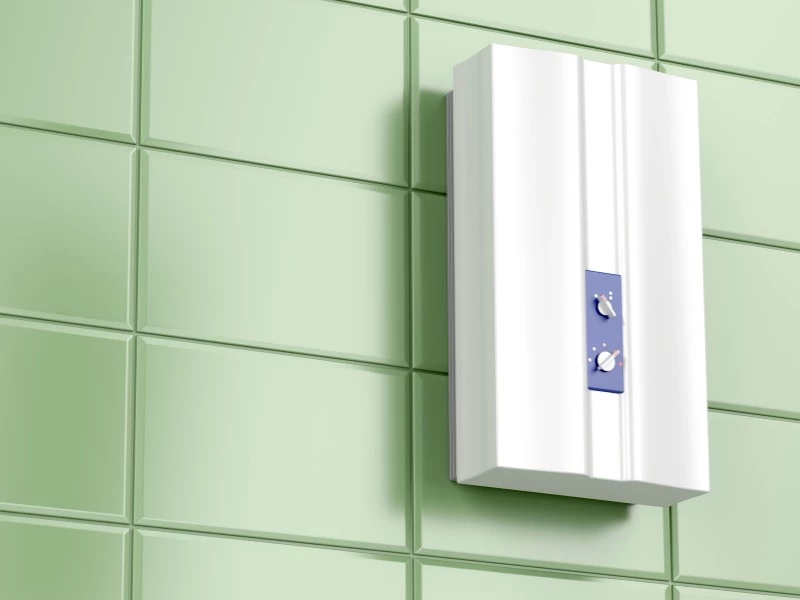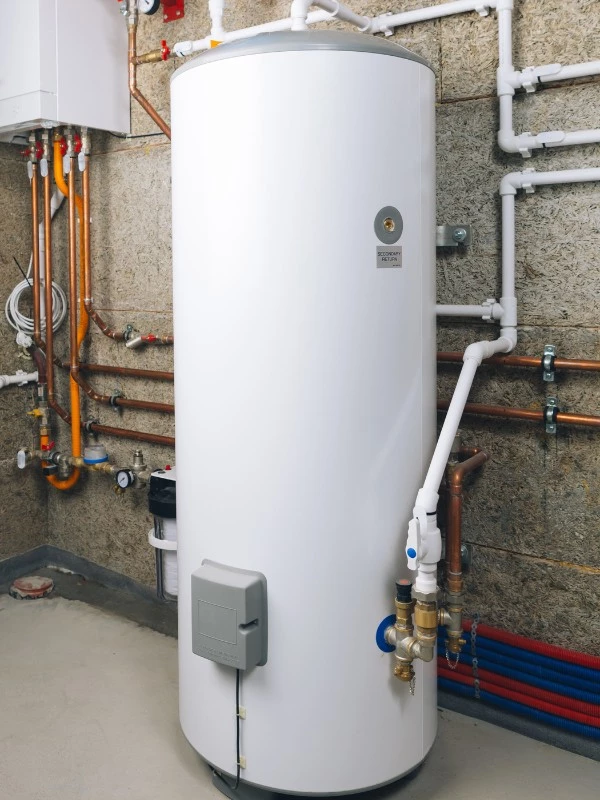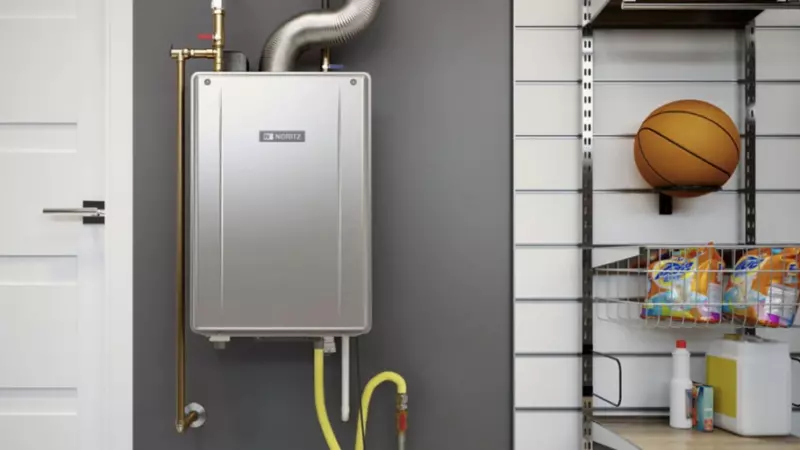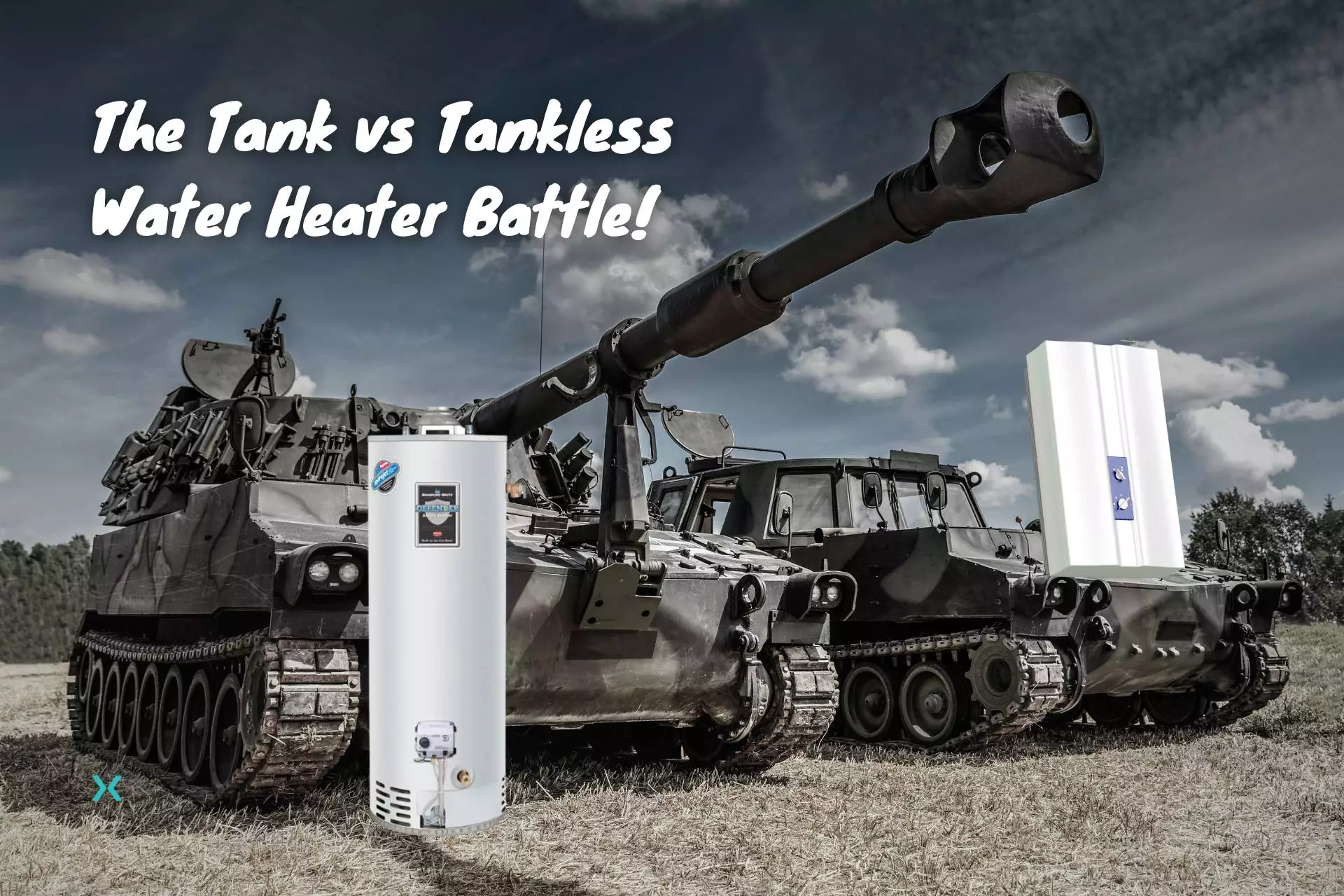The Tank vs Tankless Water Heater Battle!
Are you considering replacing your old water heater? If so, you might wonder which type of water heater is best for your home: a traditional tank heater or a newer tankless gas model.
The answer is not always straightforward.
In this article, we will explore the differences between these two types of heaters and help you make an informed decision.
Table of Contents
💧 Understanding the Basics of Water Heaters

Water heaters are essential appliances in every household, providing hot water for various purposes such as bathing, cooking, and cleaning.
However, not all water heaters are created equal. In this article, we will dive into the specifics of traditional water heaters and tank water heaters versus tankless heaters, but before that, let’s review some basic terminology and concepts.
Water heaters typically use either gas or electricity to heat water.
Gas heaters use either natural gas or propane, while electric heaters use electricity.
The type of fuel used can affect the efficiency and cost of operating the water heater.
⚒️ How Storage Tank Water Heaters Work

A tank water heater has a large storage tank that holds and heats water.
These tank-style heater tanks typically come in sizes ranging from 20 to 80 gallons (75 to 300 Liters).
The size of the storage tank water heater you need depends on the number of people in your household and your hot water usage.
When you turn on a hot water faucet, the tank releases hot water from its top, and cold water is then added to the bottom of the tank.
The water is heated by a gas burner or electric heating element located at the bottom of the tank. As the water heats up, it rises to the top of the tank, ready to be used.
This process continues until the tank to deliver hot water is empty, or the demand for hot water decreases.
Once the hot water supply is depleted, you have to wait for the tank to refill and heat up before you can use hot water again.
This waiting time can be a disadvantage if you have a large household with high hot water demand.
⚒️ How Tankless Water Heaters Work

A tankless water heater, also known as an on-demand gas water heater or instantaneous water heater, heats water as it flows through the unit without the need for a storage tank.
When you turn on a hot water faucet, cold water flows through a pipe and into the unit, where it is heated by a gas burner or electric element before flowing out of the faucet.
Tankless water heaters are more energy-efficient than storage tank water heaters because they only heat water when it is needed, eliminating standby heat loss.
Standby heat loss occurs when heat escapes from the water in the storage tank, even when you are not using hot water.
This makes tankless water heaters a great option for households that want to save on energy bills.
However, tankless water heaters have a limited flow rate, which means they may not be able to keep up with high hot water demand in larger households.
They are also more expensive to install than storage tank water heaters.
In conclusion, both tank storage water heaters and tankless water heaters have their advantages and disadvantages.
It is important to consider your household’s hot water usage and energy needs when choosing the right water heater for you.
📗 Related Reading: How Does a Tankless Water Heater Work? An In-Depth Guide
💧 Comparing the Pros and Cons

When it comes to choosing between a tankless water heater and a tank water heater, there are many factors to consider.
Each type has its own set of advantages and disadvantages that can impact your decision.
Let’s take a closer look at some of the key differences between the two.
🔥 Energy Efficiency
One of the biggest advantages of a tankless water heater is its energy efficiency.
Tankless heaters only heat water when it is needed, which means they use less energy overall.
According to Energy.gov, tankless water heaters can be up to 34% more efficient than traditional tank heaters.
This translates into lower energy costs and utility bills and reduced greenhouse gas emissions, making it an environmentally-friendly choice.
However, it’s important to keep in mind that tankless heaters often require a larger upfront investment than tank heaters.
The savings on energy bills may not offset the higher purchase and installation costs in the short term.
It’s important to weigh the long-term savings against the initial investment before making a decision.
🔥 Installation and Maintenance
When it comes to installation, storage tank water heaters are generally more straightforward than tankless heaters.
Tank storage water heaters can be installed in a variety of locations in your home, such as a closet or garage, and do not require any special ventilation.
Tankless heaters, on the other hand, need to be installed in a specific location, such as an exterior wall and may require additional venting or electrical work.
Maintenance requirements also differ between the two types of heaters.
Tankless heaters require regular flushing to prevent mineral buildup, while tank heaters need to have their storage tanks drained periodically to remove sediment and scale buildup.
It’s important to factor in the maintenance requirements when making your decision.
🔥 Lifespan and Durability
Another advantage of a tankless water heater is its longer lifespan. Tankless heaters typically last around 20 years, compared to 10-15 years for tank heaters.
Tankless heaters also have fewer parts that can wear out over time, making them more durable and less prone to leaks.
However, if a tankless heater does break down, repairs can be more costly than for tank conventional water heaters.
🔥 Cost Considerations
The initial cost of a water heater can vary widely depending on the size, brand, and installation requirements.
Tankless heaters generally have a higher upfront cost than tank heaters, ranging from $1,000 to $4,500 or more.
Tank heaters are typically cheaper, with prices ranging from $1,300 to $2,300.
Keep in mind, though, that a tankless water heater may provide savings on energy bills over time, which can help offset the higher cost of purchase and installation.
It’s important to consider the long-term cost savings when making your decision.
🔥 Space Requirements
If you’re short on space in your home, a tankless water heater may be the better choice.
Storage tank water heaters can take up a lot of space, especially if you need a large tank to meet your hot water demands.
Tankless water heaters, on the other hand, are much smaller and can be installed in a variety of locations, such as under a sink or in a utility closet.
This can free up valuable space in your home.
Overall, there are many factors to consider when choosing between a tankless water heater and a traditional tank water heater.
By weighing the pros and cons of each, you can make an informed decision that meets your needs and fits your budget.
💧 Assessing Your Household Needs

When it comes to choosing between a tank or tankless water heater, there are several factors to consider beyond the pros and cons outlined above.
Understanding these factors can help you make an informed decision about which type of water heater is best for your household.
🔥 Hot Water Demand
One of the most important factors to consider is the amount of hot water your household uses.
This can vary greatly depending on the size of your household, your daily routines, and your water usage habits.
For example, if you have a large family that frequently takes showers or baths, you may have a higher hot water demand than a single person or couple.
When choosing between a tank or tankless water heater, it’s important to consider how each type will meet your hot water needs.
Tank storage water heaters can deliver a steady supply of hot water since they have a large tank to draw from.
However, if you have a high hot water demand (such as multiple people taking showers at the same time), you may run out of hot water with a tank heater.
Tankless heaters, on the other hand, can deliver a virtually endless supply of hot water since they heat water on demand.
This on-demand water heater can be a great option for households with high hot water demands, as long as the unit is properly sized for your needs.
However, if you have extremely high hot water demands, you may require multiple tankless heaters to meet your needs.
🔥 Climate and Location Factors
The climate in your area can also affect your choice of hot water heater.
Tankless heaters can struggle to keep up with high hot water demands in cold climates since the incoming cold water must be heated to a higher temperature.
This can result in reduced hot water output and longer wait times for hot water.
If you live in a cold climate, you may need to install a larger or more powerful tankless heater to ensure an adequate supply of hot water.
Additionally, if you have hard water or live in an area with high mineral content, you may need to install a water softener or a descaling system to prevent mineral buildup in your tankless heater.
This can help to extend the life of your unit and ensure that it continues to provide hot water efficiently.
🔥 Fuel Type and Availability
The availability of fuel in your area can also affect your choice of water heater.
Tank water heaters are typically available in both electric and gas-powered models, while tankless heaters are typically powered by natural gas or propane.
If you do not have access to a natural gas supply, you may be limited to an electric tankless water heater or a tank water heater.
It’s important to consider the cost and availability of fuel when choosing a water heater, as this can have a significant impact on your long-term operating costs.
Additionally, if you choose a gas-powered water heater, you’ll need to ensure that your home is equipped with proper ventilation to prevent the buildup of carbon monoxide.
Overall, there are many factors to consider when choosing between a tank or tankless water heater.
By taking the time to assess your household needs and understand the pros and cons of each type, you can make an informed decision that will provide you with reliable hot water for years to come.
💧 Environmental Impact

Finally, it is important to consider the environmental impact of your water heater choice.
🔥 Greenhouse Gas Emissions
Gas-powered water heaters, whether tank or tankless, emit greenhouse gases into the atmosphere.
However, tankless water heaters are generally more efficient and emit fewer greenhouse gases than tank heaters.
Additionally, if you choose a gas-powered water heater, consider purchasing a high-efficiency model with a high Energy Factor (EF) rating, which indicates how efficiently the heater converts fuel into heat.
🔥 Water Conservation
Tankless models can also contribute to water conservation efforts since they do not require as much water to be heated and reheated as tank heaters do.
Additionally, some gas tankless water heaters have features such as low-flow showerheads that can further reduce water usage.
💧 Conclusion

The choice between a tank and tankless water heater depends on many factors, including your hot water demands, installation requirements, and environmental considerations.
However, with the information provided in this article, you should be able to make an informed decision and choose the water heater that is best for your home and lifestyle.
Are you a homeowner struggling with plumbing problems and looking for expert solutions?
Check out our plumbing services page today to see if we service your area and discover how Phyxter Home Services can help ease your worries. Say goodbye to plumbing problems for good!
Want to learn more about your home? Check out our other Plumbing Articles!
📗 Related Reading: DIY Guide to 15 Common Plumbing Problems & Solutions

